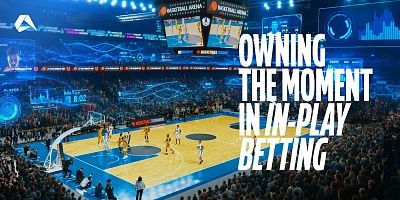You’ve probably seen it too, the casino platform that quietly added a sportsbook, or the sportsbook that suddenly started pushing blackjack tournaments. At first glance, it might look like opportunism. But look closer, and there’s a pattern emerging. Players aren’t staying in one lane anymore. They’re bouncing between reels and results, spins and spreads. And not, we should add, because they’re fickle, but because the line between entertainment formats has blurred.
Operators are catching on, and the smartest among them are already moving with purpose toward something better: integration that actually makes sense. Not by stacking features for the sake of it, but rather by rethinking what integration really means. Because when casino and sportsbook stop competing for attention and start amplifying each other, something interesting happens: the platform becomes more than the sum of its parts. It starts to feel complete.
The Business Case for Integration
There was a time when casino and sportsbook players were treated as two distinct tribes, but that assumption no longer holds. The modern bettor doesn’t fit into neat categories anymore, and operators who’ve merged both experiences under one roof are already seeing the upside. Betway, BetVictor, and Bet365 are standout examples. These brands didn’t build dual-product iGaming platforms by chance. They recognized the commercial value of reaching hybrid players who jump between blackjack and Premier League odds with the same ease they swipe between apps.
Bringing sportsbook offerings into the casino realm expands the player base and geography. Sports betting is opening doors in markets where casinos face more friction, and vice versa. Ultimately, the crossover appeal drives discovery in both directions.
Then there’s engagement. Live betting alone gives casino operators something they’ve historically lacked. Urgency. When the clock is ticking on a 79th-minute corner or the next point in a tennis match, attention sharpens, and sessions for platform interactions become more intense. Mix in dynamic cross-promotions, and the player journey becomes less of a loop and more of a cycle.
And while casino revenues can dip between content drops or promotions, a well-run sportsbook gives operators momentum all year round. Sport never sleeps. Nor do the opportunities. The trick lies in building a platform that feels alive every day of the week, not just when new slots go live or jackpots hit. That’s where the real value begins to show.
Key Features That Make Sports Betting Feel Like a Casino
What makes a bet feel more like a game? It’s not just odds or outcomes but the system that supports them. Here are some of the primary features that are transforming sportsbooks into high-energy, casino-style environments built for modern bettors.
Gamification Elements
Mystery Boxes
Borrowed from the world of loot boxes, Mystery Boxes introduce an element of surprise. In online casinos, they're used to reward players with random bonuses or free spins. Applied to sportsbooks, they can offer unexpected rewards, like a free bet or odds boost, after placing a wager. This unpredictability taps into the human love for surprises, enhancing engagement and repeat play.
Double or Nothing
A classic gambling proposition, Double or Nothing allows players to risk their winnings for a chance to double them. In sports betting, this can be implemented post-win, offering bettors the option to re-wager their returns on another event. It's a high-stakes feature that appeals to thrill-seekers and can significantly increase time-on-site metrics.
Fast Bet & Micro Betting
Fast Bet and micro betting cater to the modern bettor's desire for immediate gratification. Instead of waiting for the outcome of an entire match, players can wager on minute-by-minute events, like the next goal or point. This rapid-fire betting style keeps users engaged throughout the event, mirroring the quick-play nature of slot machines in casinos.
Bet Builders and User-Generated Parlays
Bet Builders empower users to create personalized bets by combining multiple selections into one wager. This mirrors the customization found in casino games where players can choose their stakes, paylines, and features. User-generated parlays increase the sense of ownership and engagement, as bettors craft bets that reflect their predictions and strategies.
Live Broadcasting & In-Play Experiences
Embedded Live Streaming
When a live stream sits side-by-side with a bet slip, engagement takes on a new form. It stops being a stats-driven prediction and becomes an experience as bettors watch the action unfold in real time. Live streaming brings sportsbook one step closer to the theatre of a live casino table, where emotion and momentum fuel decision-making. And with streaming embedded into the interface, players stay in the moment longer, driving both stickiness and average session value.
Interactive Stat Overlays
Raw odds don’t tell a story, but stat overlays do. These live, on-screen insights provide players with the kind of instant data they need to bet with confidence: team form, current pressure, and recent possession swings. Think of them as the HUD (Heads-Up Display) in a casino poker game, quietly arming the user with real-time cues. The effect is subtle but powerful. It transforms passive viewers into active bettors, reinforcing trust in the platform while keeping minds (and fingers) on the trigger.
Real-Time Bet Prompts and UI Animations
Casino games flash, chime and react, and the best sportsbook UIs are starting to follow suit. Real-time bet prompts serve as subtle nudges, popping up with market suggestions as soon as the action begins. These animations do more than decorate the screen. They guide the player’s eye to where the action’s heating up, with the same pacing you’d find in a casino: moments of calm, quick bursts of energy, then a decision. Each moment adds momentum, turning live betting into something that feels alive and responsive and a cue to act.
Shared Wallets and Unified UX
Few things break the spell of a betting session faster than friction, especially when it comes to money. A shared wallet removes that barrier entirely. Instead of juggling balances between casino and sportsbook, players see one pot. Merging payment mechanics in this way doesn’t just simplify the experience, it changes behavior. With no mental accounting or awkward transfers, players drift effortlessly between blackjack hands and live football odds without thinking much about the switch.
Moving funds is simple enough, but the real value is in the loyalty that moves with the account holder. When bonus mechanics are divided, with free spins here and bet credits there, etc., the value gets lost in translation. But when bonuses sync across platforms and loyalty points accumulate regardless of the vertical, every action feels connected. It’s a subtle but meaningful shift. The experience becomes unified not just in function, but in psychology. And when casino and sportsbook no longer compete for attention but feed each other’s momentum, the whole platform starts to feel unified and complete.
Infrastructure That Powers a Unified Experience
Fortunately, integrating a sportsbook into an existing casino platform no longer requires a complete overhaul. Modular API frameworks have revolutionized this process, allowing operators to easily and effortlessly incorporate sportsbook functionalities into their current systems. These APIs facilitate real-time data synchronization, ensuring that odds, game states, and other critical information are consistently up to date across both platforms. Such integration not only accelerates deployment but also enhances the overall user experience by providing a cohesive and responsive interface.
A unified user experience is further achieved through responsive design and intuitive navigation. By maintaining consistent UX elements across both casino and sportsbook sections, players enjoy a natural transition between different gaming experiences. It is no secret that personalized lobbies and tailored recommendations, informed by player behavior and preferences, enhance engagement and retention. This level of personalization transforms the platform into an agile environment that adapts to individual user journeys.
Behind the scenes, solid security measures and compliance protocols are another essential. Implementing comprehensive Know Your Customer (KYC) and Anti-Money Laundering (AML) procedures ensures that operators meet regulatory requirements and protect against fraudulent activities. Cross-vertical fraud monitoring and player profiling enable the detection of suspicious behaviors, safeguarding both the platform and its users. By integrating these security measures across both casino and sportsbook offerings, operators can maintain a trustworthy and compliant iGaming operation.
CRM & Retention Tools for Hybrid Platforms
At its core, retaining players isn’t about numbers, it’s about timing. A player who’s just cashed out a five-leg parlay doesn’t need a generic bonus pop-up. They need relevance and context. This means providing a prompt that feels like a continuation of the experience, not just a marketing afterthought.
That’s where the best CRM systems earn their keep. Not by bombarding inboxes or flooding dashboards, but by knowing when to say something, and when to stay quiet. Timing beats frequency consistently in this respect. A bet prompt that lands just as a tennis match goes to a deciding set will always outperform a static Thursday push with no anchor.
And when it comes to loyalty, volume alone doesn’t move the needle anymore. Players remember platforms that recognize variety, where switching between blackjack and Bundesliga doesn’t reset progress but adds to it. Better still, if they get to choose their own rewards.
Top 12 CRM Retention Tools for Hybrid Platforms
Here are 12 CRM tools built for hybrid platforms, each one focused on timing, personalization, and player context. Together, they form the backbone of effective retention.
| Tool | Description | Example Use-Case |
|---|---|---|
| 1 Behavior-Based Segmentation | Group users based on behavior (e.g., sports-first, casino-first, frequency) | Target sportsbook bettors with casino intro offers after a major sports event |
| 2 Cross-Vertical Loyalty Programs | Unified rewards across the casino and sportsbook | Points from slots and bets both count toward tier progression |
| 3 Bonus Wallets with Cross-Product Eligibility | Bonuses that apply across both verticals | Place a sportsbook parlay bet, receive 20 free spins |
| 4 Real-Time Event-Triggered Campaigns | Offers triggered by live sports or in-game events | Send a push alert when a player’s backed team scores |
| 5 Personalized Game and Bet Recommendations | AI-driven content delivery based on player history and preferences | Suggest blackjack to roulette regulars, or NBA bets to football fans |
| 6 Churn Prediction Models | Machine learning to spot drop-off risk early | Offer a reload bonus to users whose activity is trending downward |
| 7 Lifecycle Campaign Automation | Automated messaging by player stage | Deliver welcome journeys, inactivity reactivation, or VIP nudges based on user progression |
| 8 Multi-Channel Messaging | Campaigns via email, SMS, push, and in-app messaging | Send pre-match odds via SMS and free spin reminders via push notifications |
| 9 Smart Retargeting | Triggered outreach after session drop or incomplete activity | Remind players to finish building a parlay or return to an unfinished slots session |
| 10 Gamified Missions & Challenges | Cross-vertical tasks and quests that encourage broader engagement | “Bet on three matches, win 20 spins” or “Try three new slot providers” |
| 11 Self-Serve Promotions Hub | Allow players to select personalized bonuses | Let users choose between a free bet, cashback, or free spins based on their playing style |
| 12 Player Profiling & Session Analytics | Deep insights into player paths and behavior | Spot drop-off points, track most frequent casino-to-sportsbook journeys |
Complexities, Pitfalls and the Platforms that Got It Right
Some platforms make switching between sportsbook and casino feel effortless. Others feel like two different sites. The difference usually comes down to who built it and how.
Lessons from successful hybrid betting platforms
Some of the more successful hybrid betting operations didn’t just bolt a sportsbook onto their casino. They built systems that make switching between the two feel second nature. Bet365 set the benchmark early, not just by unifying accounts and balances, but by making the user journey feel uninterrupted. Players can move from in-play odds to live roulette without losing momentum, thanks to a tightly integrated interface and a cross-promotional strategy that rewards both depth and variety of play.
Likewise, Betway takes a similar player-first approach with a loyalty system that encourages exploration. Whether it’s sports or slots, the activity follows a similar progression, and that sense of continuity keeps players coming back. BetVictor, meanwhile, refined its product with an interface stripped of clutter, bonuses feel intentional, and cross-vertical offers come with just enough incentive to trigger curiosity.
What unites these platforms, however, is more than just functionality. Greater coherence ensures that nothing feels bolted on. They treat casino and sportsbook not as competing domains, but as parts of the same conversation that keeps players engaged.
Considerations for Integrating Offerings
While platforms like Bet365, Betway, and BetVictor exemplify the integration of casino and sportsbook experiences, achieving such cohesion presents several operational, regulatory, and cultural challenges. Suffice it to say, the journey from independent systems to a unified platform demands meticulous planning, substantial investment, and a deep understanding of both verticals.
Regulatory Hurdles
Integrating casino and sportsbook offerings requires compliance with distinct licensing regimes, each with its own set of regulations, responsible gambling mandates, and technical standards. Operators must ensure that their platforms meet the demanding requirements of bodies like the UK Gambling Commission, which oversees both sectors with rigorous standards.
Cost Considerations
The financial outlay for integration is generally significant. Operators must invest in real-time odds feeds, employ skilled trading teams, implement sophisticated risk management engines, and undergo regular compliance audits. These elements are essential to maintain a competitive and compliant hybrid platform.
Risk Exposure
Hybrid platforms face heightened exposure to risks such as bonus abuse, arbitrage betting, and match-fixing. Implementing advanced fraud detection systems and firm risk management strategies is necessary to safeguard the platform's integrity and financial stability.
Platform Stress
The technical demands of supporting real-time betting, live streaming, and dynamic odds require a resilient and scalable backend infrastructure. Operators must ensure their platforms can handle peak loads without compromising performance or user experience.
Cultural Shift
Successfully merging casino and sportsbook offerings necessitates a cultural transformation within the organization. Teams must adapt to new workflows, and customers require education to navigate the integrated platform effectively. This shift involves rethinking internal processes and customer engagement strategies to promote a cohesive user experience.
Common Pitfalls That Derail Hybrid Projects
If integration were simply a technical task, far more operators would have nailed it by now. But the reality is that many hybrid projects falter, not due to a lack of ambition, but because they fail to see their blind spots. Overlooking the finer details of how casino and sportsbook products interact at scale can create friction that quietly drains engagement, revenue, or, worse still, regulatory confidence.
Below are the most common reasons why hybrid betting platforms underperform or fail outright. Each one may sound familiar. That’s because they’re more common than most operators like to admit.
- Fragmented User Experience. Disjointed interfaces make switching between products feel clunky and unnatural.
- Inadequate Regulatory Compliance. Minor oversights in licensing or reporting can result in significant penalties.
- Insufficient Risk Management. Failure to track arbitrage or bonus abuse exposes the entire platform.
- Poor Data Integration. Without unified data, marketing is guesswork, and personalization falls flat.
- Neglecting Mobile Optimization. A desktop-first approach alienates the majority of modern bettors.
- Delayed Market Entry. Long development cycles cost momentum and market share.
- Inadequate Customer Support. Disconnected help desks frustrate users and erode loyalty.
- Lack of Localization. Generic content weakens its appeal across languages, cultures, and regulations.
- Overcomplicated Navigation. Confusing layouts discourage exploration between the online casino and sportsbook operations.
- Ineffective Loyalty Programs. Misaligned rewards fail to motivate cross-vertical play.
- Inflexible Technology Stack. Legacy systems can’t adapt to changing user demands or regulatory updates.
- Insufficient Staff Training. Internal teams aren’t always equipped to run a fully integrated platform.
Building for Both Sides of the Betting Experience
Knowing where projects fail is the first step. The next step is to choose partners who can help you build something better. Altenar and Agreegain work in sync, combining sportsbook and casino expertise under a single, integrated, operator-focused umbrella.
Altenar: Your Proven Provider of Sportsbook Technology
Altenar’s sportsbook technology is more than high performance - it’s built for hybrid success. Its modular architecture and API-first approach reduce friction when layering sportsbook functionality onto existing casino platforms, while custom widgets and front-end flexibility support brand and UX continuity. For operators working with Agreegain, that means cohesion, not compromise, between verticals. Altenar’s real-time data infrastructure handles high traffic loads, directly addressing platform strain. In addition, regulatory confidence is built in, with certifications across many markets, including the UK, Malta, and Brazil, among other global jurisdictions.
Awarded Best Online Sportsbook Provider 2025 at the SiGMA Awards Americas, Altenar backs its product with around-the-clock support and a deep understanding of market-specific compliance. For platforms serious about integrating casino and sportsbook without sacrificing performance, Altenar offers more than a system. We offer reliability at scale.
Agreegain: Your All-in-One Casino Integration Partner
Agreegain approaches casino integration the way it should be done - modular, efficient, and friction-free. For hybrid operators, that means no back-end chaos, no front-end guesswork, and no delays getting to market. The platform combines over 10,000 games with a powerful set of built-in tools: CRM, BI dashboards, KYC support, and anti-fraud controls. Everything needed to meet regulatory requirements while still operating at speed and scale.
Where hybrid projects often stall, like disjointed promotions, messy data flows, and a lack of personalization, Agreegain closes the gaps. Its flexible front-end framework supports consistent branding, and its gamified campaign layers make player retention feel like part of the product, not a separate effort.
Agreegain isn’t trying to be everything. It’s focused, fast, and built to slot cleanly into a shared ecosystem. For operators working alongside parent company Altenar, it offers the level of precision that matters, making integration feel less like stitching and more like strategy.
The Power of Combined Integration
When iGaming businesses bring together Altenar’s sportsbook experience with Agreegain’s casino expertise, they’re not just linking two platforms. Ultimately, they’re stepping into a shared philosophy: entertainment-first, data-aware, and built with scale in mind.
Whether sportsbook is the entry point or casino is the starting block, the real value emerges when each one amplifies the other. Altenar’s fast deployment and trading control pair naturally with Agreegain’s flexible frontend and customizable features, allowing operators to shape hybrid experiences that actually reflect how players engage across verticals.
The result isn’t just operational efficiency, but a strategy that holds everything together when building, rolling out, and scaling up. For teams thinking long term, this kind of integration provides structural integrity with strategic clarity. And that’s a strong place to build from.
Looking to unify sportsbook and casino without compromise? Let’s make your hybrid strategy tangible. Schedule a session with our team and explore how integration works across various verticals in real time, with real context.













